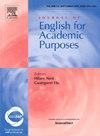探讨高等教育学术英语(EAP)的包容性教学实践:实践建议
IF 3.4
1区 文学
Q1 EDUCATION & EDUCATIONAL RESEARCH
引用次数: 0
摘要
本研究通过严格的、多方法的研究设计,为高等教育(HE)的包容性学术英语(EAP)提供了一个上下文敏感的、循证的框架。针对包容性在EAP环境中如何概念化和实施方面持续存在的差距,该研究整合了来自定性调查、合作制作焦点小组和使用最佳契合框架综合的系统文献综述的数据。研究结果表明,EAP中有意义的包容性需要在三个系统层面协调行动:微观(个人实践)、中观(部门结构)和宏观(制度政策)。在微观层面上,包容性教学法是通过差异化教学、文化响应式教学、公平评估和反思性实践来实现的。中观层面强调跨学科合作、课程非殖民化和员工发展的重要性,而宏观层面则强调机构对公平、语言公正和多语言政策的承诺的必要性。由此产生的框架具有实际适用性和适应性,为将包容性纳入EAP教学并使其与更广泛的社会正义目标保持一致提供了一个战略模型。通过将理论与实践相结合,本研究对EAP包容性这一研究不足的领域做出了贡献,并将EAP重新定位为促进高等教育公平性和非殖民化教学法的变革场所,而不是中立的支持功能。研究结果为致力于为不同语言和文化的学习者创造公平的学术环境的教育工作者、项目负责人和政策制定者提供了具体建议本文章由计算机程序翻译,如有差异,请以英文原文为准。
Exploring inclusive teaching practices of English for Academic Purposes (EAP) in Higher Education (HE): Recommendations for practice
This study presents a context-sensitive, evidence-informed framework for inclusive English for Academic Purposes (EAP) in Higher Education (HE), developed through a rigorous, multi-method research design. In response to persistent gaps in how inclusivity is conceptualised and implemented in EAP settings, the study integrates data from a qualitative survey, co-production focus groups, and a systematic literature review using Best Fit Framework Synthesis. Findings reveal that meaningful inclusivity in EAP requires coordinated action across three systemic levels: micro (individual practices), meso (departmental structures), and macro (institutional policies). At the micro level, inclusive pedagogy is achieved through differentiated instruction, culturally responsive teaching, equitable assessment, and reflective practice. The meso level emphasises the importance of interdisciplinary collaboration, curriculum decolonisation, and staff development, while the macro level underscores the need for institutional commitment to equity, linguistic justice, and multilingual policy. The resulting framework is both practically applicable and adaptable, offering a strategic model for embedding inclusivity into EAP instruction and aligning it with broader social justice goals. By bridging theory and practice, the study contributes to the under-researched area of EAP inclusivity and repositions EAP not as a neutral support function, but as a transformative site for advancing equity and decolonial pedagogy in higher education. The findings offer concrete recommendations for educators, programme leads, and policymakers committed to creating equitable academic environments for linguistically and culturally diverse learners.p
求助全文
通过发布文献求助,成功后即可免费获取论文全文。
去求助
来源期刊

Journal of English for Academic Purposes
Multiple-
CiteScore
6.60
自引率
13.30%
发文量
81
审稿时长
57 days
期刊介绍:
The Journal of English for Academic Purposes provides a forum for the dissemination of information and views which enables practitioners of and researchers in EAP to keep current with developments in their field and to contribute to its continued updating. JEAP publishes articles, book reviews, conference reports, and academic exchanges in the linguistic, sociolinguistic and psycholinguistic description of English as it occurs in the contexts of academic study and scholarly exchange itself.
 求助内容:
求助内容: 应助结果提醒方式:
应助结果提醒方式:


